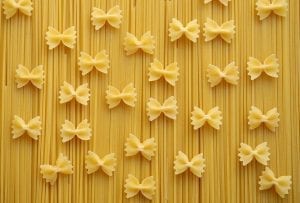Pasta is delicious – there’s no denying that! Pasta is often seen as the bane of many healthy people’s lives, a comfort food that’s versatile, but it may not be the healthiest option on the menu. But is this always necessarily true?
Here are some fun facts about pasta and its nutritional values you might want to bear in mind.
1. It’s very high in carbs – that’s a fact.
Pasta gets a bad reputation because it is high in carbohydrates. This also means that it can break down into sugar, which too much of can lead to weight gain.
2. …but, there’s good news.
However, it actually has a fairly low glycaemic index. This means that blood sugars do not spike as quickly as you might expect when you eat it. This means that it can take longer for you to digest pasta than other foods, for example.
3. …and that means…
This also means that pasta is really filling! Even a smaller amount will likely make for a filling meal, regardless of the accompaniment.

4. There are many ways to make pasta.
Not all pasta is made the same. Most pasta is enriched or refined. A healthier alternative is whole wheat, which many people swap out if they are trying to change their diets.
For example, one cup of refined spaghetti has six more grams of carbohydrates than whole wheat. It also has more calories, with 220 per cup compared to 174 per cup for whole wheat.
5. It’s not good for coeliacs.
Pasta is high in gluten. Gluten is a protein which many people are sensitive to, as it can cause them digestive complaints. Many people who are sensitive to gluten suffer from celiac disease.
Therefore, any sufferers are advised to avoid traditional pasta as far as possible. There are gluten-free alternatives.
6. There are plenty of hidden pasta perks.
However, those who can eat gluten will benefit from many foods that contain it. For example, gluten pasta is starchy and packed full of fibre. This means that it may actually help you lower the risk of heart disease and diabetes.
7. Save the salt!
Pasta is also relatively low in sodium. Sodium and salt levels are often notoriously high in processed foods and can be extremely bad for you if consumed regularly. It is therefore worth keeping these levels in check.
8. It’s not necessarily about the pasta…
Pasta can be a low calorie, diet friendly food. However, what stacks up the calories for many people is what they eat with it. What’s more, many people boil pasta with a lot of salt – which, again, can be very harmful for your body in the long run.
9. Pasta can fight inflammation.
Pasta is also rich in resistant starch. According to studies, this can help us to prevent inflammatory diseases and conditions in our digestive system. This is thanks to the fatty acids created during carbohydrate fermentation.

10. Don’t overdo it, and you’ll be fine.
Health bodies recommend that you actually try to make carbohydrates up to 65% of your daily diet. Therefore, by eating a healthy amount of cooked pasta, you might actually be taking healthier steps than you think. Don’t always see pasta as the enemy!
FAQs about Pasta
Can you eat pasta as part of a diet?
Yes! Providing you keep your carbohydrates in check, you can eat pasta as diet food. It’s part of the popular Mediterranean diet, for example.
Is it safe to eat pasta every day?
Not necessarily - it depends on portions - as starch can be very bad for you.
What’s healthier - pasta or rice?
Rice is lower in calories by about a third - it’s therefore a better diet option!
Do you know any fun facts about pasta? Share them in the comments below!










